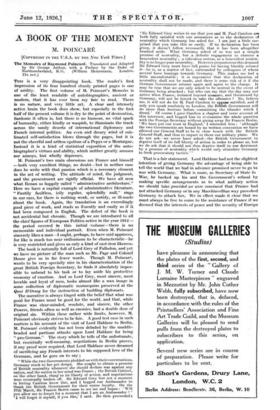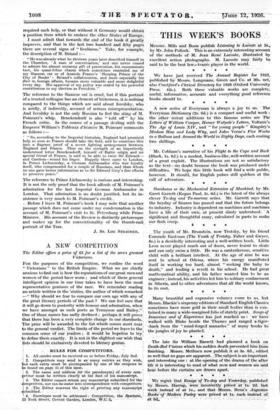A BOOK OF THE MOMENT
M. POINCARn
[COPYRIGRT IN THE U.S.A. BY THE New York Tiffin.] The Memoirs of Raymond Poineard. Translated and Adapted by Sir George Arthur, with a Preface by the Duke of Northumberland, E.G. (William Heinemann. London. 21s. net.)
Tins is a very disappointing book. The reader's first impression of its four hundred closely printed pages is one of aridity. The first volume of M. Poincare's Memoirs is one of the least readable of autobiographies, ancient or modern, that it has ever been my fate to read. There is no nature, and very little art. A clear and intensely
active brain the book does show, but especially in the first half of the present volume it is dry to the point of desiccation. Sardonic it often is, but there is no humour, no vital spark of humanity, either kindly or waspish, to illuminate the track across the sandy deserts of international diplomacy and French internal politics. An even and dreary, wind of sub- limated self-satisfaction blows through the pages, but it is not the cheerful and artless egotism of a Pepys or a Montaigne. Instead it is a kind of statistical exposition of the auto- biographer's virtues and ability, which neither greatly amuses nor annoys, but wholly depresses.
M. Poincare's two main obsessions are France and himself —both very excellent things, no doubt—hut in neither case does he write with that passion which is a necessary element in the art of writing. The attitude of mind, the judgment, and the presentment are rigidly official. We have all seen what Henan so happily called "administrative architecture." Here we have a capital example of administrative literature. " Fautily faultless, icily regular, splendidly null," rings in our ears, for there is nothing weak, or untidy, or ill-made about the book. Again, the translation is an exceedingly good piece of work, and reads as fl uently and easily as if it had been composed in English. The defect of the book is not accidental but chronic. Though we are introduced to all the chief figures of European Politics active in the year 1912— the period covered in this initial evolume-:-there is no memorable and individual portrait. Even when M. Poineare sincerely likes a man—I ought, perhaps, to have said approves, for like is much too near enthusiasm to be characteristic—he is very restricted and gives us only a kind of cast-iron likeness.
The book is naturally full of Lord Grey of Fallodon, and yet we have no picture of the man such as Mr. Page and Colonel House give us in far fewer words. Though M. Poincare, wants to be very specially nice in his characterization of the great British Foreign Secretary, he finds it absolutely impos- sible to unbend to his task or to lay aside his protective economy of emotion. And so Lord Grey, most sincere, most lovable and loyal of men, looks almost like a wax image in some collection of diplomatic mannequins preserved at the Quai D'Orsay for the instruction of budding diplomats.
The narrative is always tinged with the belief that what was goOil Tor France must be good for tbe world, and that, while France was clear-minded, resolute, and sincere, the other Powers, friends often as well as enemies, had a double dose of original sin. Within these rather wide limits, however, M. Poincare obviously strives to be fair. A good test case in such matters is his account of the visit of Lord Haldane to Berlin. M. Poincare evidently has not been deluded by the muddle- headed and partisan attacks upon Lord Haldane for being " pro:German." The story which he tells of the unfortunate, but essentially well-meaning, negotiations in Berlin proves, if any proof were required, that Lord Haldane never dreamed of sacrificing any French interests to his supposed love of the Germans, and he goes on to say ;
"While the two Governments plodded on with their conversations, Germany stuck to her pet design. She sought to obtain a promise of British neutrality whenever she should declare war against any nation, and the nation in her mind was France ; the British Cabinet, on ihe other hand, clung' to itit liberty of action, and negotiations were eventually broken off. Sir Edward Grey lost-not a moment in letting Cambon know this, and I begged our Ambassador to thank the British Government for their entire loyalty. On the 27thldirch, Sir Francis Bertie cable to see 'me and began : Will you allow me to forget for a moment that I am an Ambassador?' I will forget it myself, if you like,' I said. He then proceeded*
Sir Edward Grey writes to me that you and M. Paul Cambon are both fully satisfied with our assurances as to the declaration of
neutrality which Germany has asked for. I am just a little sur- prised that you take this so easily. If no declaration has been given, it doesn't follow necessarily that it has been altogether
brushed aside. What Germany asked of us was not a simple 'promise of neutrality, but a definite engagement to observe a benevolent neutrality ; a ridiculous notion, as a benevolent neutra- lity is no longer pure neutrality. However preposterous this demand Sir Edward Grey must have full praise for having blankly refused it—he is, as a matter of fact, surrounded by colleagues of whom several have leanings towards Germany. This makes me feel a little uncomfortable ; it is imperative that this declaration of neutrality shall not be made, and there is some risk of it if the German Government returns again and again to the charge. It may be true that we are only asked to be neutral in the event of Germany being attacked ; but who can say that the .day may not arrive when France, irritated beyond measure, and threatened by Germany, will not be forced to take the offensive ? No, believe me, it will not do for H. Paul Cambon to aKiear satisfied, and if only you speak resolutely to London, the British Government will do more than hesitate before committing the blunder which I dread.' Of course I gave Cambon a chapter and verse account of this interview, and begged him to re-examine the whole question with the Foreign Secretary without giving away Sir Francis Bertie. We have put our trust in England,' I reminded him : although the two Governments are bound by no written convention we have allowed our General Staff to be in close touch with the British General Staff, and thus to impart to them our military plans. We do not ask—we never have asked—the British Government to deprive itself of its full liberty of action in order to please us, but we do ask that it should not thus deprive itself to our detriment by a promise of neutrality which would only stimulate Germany to fresh provocatory tactics.'" That is a fair statement. Lord Haldane had not the slightest intention of giving Germany the advantage of being able to tell the world that we had in advance promised never to go to war with Germany. What is more, as Secretary of State fo War, he backed up his and the Government's refusal by making specific arrangements as to what military action we should take provided we were convinced that France had not attacked Germany or in any Maechiavellian way provoked Germany to attack her. We in effect made it clear that we must always be free to come to the assistance of France if we deemed that the interests of peace and the security of Europe
required help, or that Without it Germany Would obtaiii
i.Position from Which to enslave the Other States Of Europc ; I must 'admit that towards the end of the boa- it greatly
improves, and that in the last two -hundred fiftY pages
there are several signs of "liveliness Take, • for eXiniPlef, the -description of M. Briand '• 3 "He was' already what he thirteen years later described himself to the Chamber, 'A man of conversation,' and one never ceased to admire his almost uncanny gift of penetration,,his consummates tact; his - quasi-feline . charm which sornotimes. reminded .me :of my- Siamese eat or of 'Anatole France's 'Sleeping Prince of the Pity of Books '.: Briand's collaboration, and more _especially his flair in foreign 'affairs, became more valuable and -more delightful every day.' His approval of thy. policy was sealed by his 'powerful
contribution to my election as President." _ The reference to the Siamese cat is cruel, but if this portrait of a trusted colleague has an element of bitterness; it is nothing compared to -the things which are said about. Isvolaky, Who
- is acidly, if indirectly, accused Of serious miarepresentatiOn. . And Isvolsky. is not the only Russian to feel the sting of M.
Poincare's _whip.. Benekeridorff is also "told _ off" - by 'his. French. critic. In the course of a passage dealing With the Emperor' William's TaldecniX d'histoire M. POincareeommenta as follows :— . _ _ . s . ' "SO, according to the Imperial historian, England had -promised help as soon as France should take the field, and he construes this into a flagrant Proof Of a secret fighting arrangement hetvieen England and -France. Thus on the strength of an imperfectly Understood letter Benekendorff, -himself -of -Baltic -origin and'nd special friend of France, is said to be able to twist Sir Edward—. and Cambon—round his finger. Happily them came to LondOn,- In Prince Lichnovisky, a German Ambassailer Whit) Was' loyalty itself, who :compensated for a couple: Of. Russians, and then whom no one gave better information as to Sir Edward Grey's fine-efforts
to preserve peace." . .
The reference to prince Liclmowsky is curious and interesting. It is not the only proof- that the book -affords of M. Poineare's admiration for the last Imperial German Ambassador in London. That admiration is no doubt justified, but its in-
sistence is very much to M. Poincare's credit.; .
Before I leave M. Poincare's book I may note that another.
passage which does not come under my condemnation is the account of M. poincares visit to St. Petersburg while. Prime. Minister.- His account of the -Review is distinctly picturesque. and makes up for the conventionality of the thumb-nail,
portrait of the Tsar. -
J. Sr. LOE S'TRAEHEY.























































 Previous page
Previous page